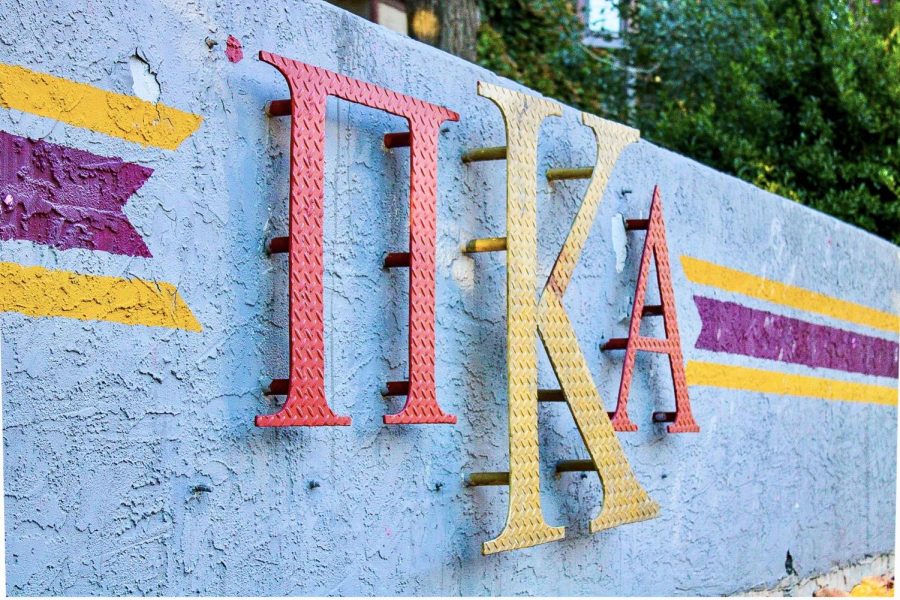Langley: Greek Life Promotes Classism and Bigotry
Pi Kappa Alpha on Greek Row University of Utah on Sept. 25, 2022. (Photo by Sophie Felici | The Daily Utah Chronicle)
October 4, 2022
Greek life is a staple of American culture and tradition. Many presidents, state officials and successful individuals have ties to these associations. Accordingly, many regard Greek life as highly prestigious and conducive to success.
However, these societies have deep and fundamental issues. Despite promoting self-betterment, community service and leadership, Greek life organizations have been at the center of controversy and immoral behavior. Sexual assault and alcohol abuse are commonplace in fraternity and sorority houses across U.S. campuses, but these issues are not the primary source of concern — rather, they’re symptoms of a more significant fault. These organizations have promoted elitism, racism, sexism and many more prejudicial beliefs. And through fees and exclusive attitudes, they have kept out BIPOC and lower-class students for generations.
Greek life has long given a home to classism and bigotry on college campuses across the U.S. and in Utah. We need to put an end to these institutions of oppression.
Classism Within Greek Life
Greek life organizations have been run for and by the wealthy. With exorbitant fees, some simply cannot join Greek life. At the University of Utah, those wanting to enter these societies must pay over $1,000. This initial fee, alongside university, annual membership and all the other fees required throughout college, make continued membership impossible for some.
Some Greek life Organizations’ fees at other institutions can be up to $3,000-$5,000 annually. For the average American, these fees make Greek life unattainable. Arguing that scholarships can aid lower-class students with entry still sets a higher bar for those struggling to pay fees. Scholarships are not guaranteed, so only a select few could be chosen.
The most common advertisements for Greek life are networking, career opportunities and leadership positions within one’s university, which is misleading. What happens in Greek life is not networking and leadership training but instead an encouragement to engage in nepotism. Fraternity men control a highly disproportionate amount of wealth and power, despite only making up around 2% of the population. This trend is also present in student leadership at the U. Despite only making up 9% of the student body, Greek life members control nearly half of ASUU positions. While this would be acceptable if Greek life were more inclusive, this is simply not the case.
Racism: A Staple of Greek Life
Racism has been a common occurrence in Greek life organizations throughout their history. Today students of color, who make up less than a quarter of Greek life membership, face blatant racism daily within these communities. Since the beginning of the Black Lives Matter movement, many have come forth detailing their negative experiences within Greek life.
Ayshea Banes, a woman of color attending Wichita State University, recounted her experience with racism in her sorority.
“In the beginning, when I first joined, normally everybody’s super nice to the new members because they obviously want you to love the chapter that you’re in,” she said. “And so, going into Greek life was really good.”
However, this soon changed after a member of her sorority stated that “she personally didn’t support black lives.” While many of her sisters, primarily minorities, left the sorority after this, Banes stayed. Unfortunately, problems continued to arise for her and other minorities within her sorority.
“There were a lot of microaggressions that were thrown around,” she said. “And people expect the minorities, because we are a minority in the organization to just kind of take it.”
Heartbreakingly, when Banes confronted her sisters about how these issues made her feel, she said, “They just turned it around and made me feel guilty for speaking out on it.” Then, they went further with this antagonization. “There was bullying involved … I’m scared of it coming back.”
When asked if she would recommend Greek life to other students of color, she said, “I would not recommend it because it is so tiring having to fight something that you will lose eventually because you are going to be constantly outnumbered.”
Sexual Assault: Another Staple
Sexual assault and rape in Greek life are widespread as well. High-profile cases like Brett Kavanaugh’s and other cases at the U have turned the public’s attention toward one of Greek life’s darkest aspects. In addition to eyewitness and anecdotal accounts, studies show that girls in sororities are 74% more likely to be raped than those who aren’t, and men in fraternities are three times more likely to commit rape. This tendency for sexual assault and rape is worsened by alcohol abuse within Greek life, with an average of 78% of sexual assaults occurring while a woman is intoxicated.
We see Greek life’s alcohol abuse through the Instagram page “Utahchicks,” where anonymous photographers take pictures of and post intoxicated and unconscious young women. Despite this page’s horrifying, immoral and embarrassing content, the administration has not taken it down since its first post in 2020.
The U has pledged to take action against sexual assault, but so does every law-abiding citizen. A pledge is not enough. And especially when it keeps on happening, action, namely banning these institutions outright, must be taken.
Greek life is also notorious for hazing. It still occurs despite being outlawed in 44 states and Washington D.C. Hazing consists of humiliating acts that can lead to depression, shame, death and suicide. And fatalities have only increased over time.
It’s clear that Greek life has and will continue to promote classism, bigotry and criminal activity. With apparent demand from the public to abolish these organizations, it is only rational for the U and other institutions to rid themselves of sororities and fraternities. Warnings and intermittent suspensions should be a thing of the past — now is the time to establish a just, equitable upper education experience.













Rebecca Smyrniotopoulos • Oct 7, 2022 at 9:12 am
Spot. On.
There’s also the fact they all mispronounce the names of the Greek letters, an atrocity in and of itself.
Anon • Oct 6, 2022 at 10:17 pm
This opinion seems biased and not very opionated.
These opinion articles are always left leaning and written from some polysci writer and this one is definitely no exception.
It would be nice if we taught students to view both sides of an argument and even make a strong argument for the opposite side instead of heavily left leaning and promoting Marxist ideas.
Jack O'Leary • Oct 5, 2022 at 10:36 am
I would like to challenge this piece as one-sided, biased, and an inaccurate picture of what Greek life is. While yes, Greek life has historically had its problems, its barriers, and bad actors, the vast majority of the organization is completely opposite of the small view shown here. First, addressing classism, anyone and everyone can join Greek life regardless of their income, background, race, ethnicity, or sexual orientation. There are scholarships for those that need help paying dues, accommodations made when necessary, and active members supporting those in times of crisis. One of the main efforts of the FSL Office at the U is to grow the community and help others find a home for them. If Greek life was not wanted, why is it actively growing? Greek life is active, involved, and high achieving, it motivates people to grow as individuals and succeed. Furthermore, they are service-based organizations focused on helping members of their communities. Fraternities and sororities nationwide raise millions of dollars every year in philanthropic efforts to support causes like cancer research or make-a-wish or mental health groups. Looking at your points on sexual assault, while yes, there has been a high number in Greek life, consider the fact that there are numerous trainings and safety mechanisms put in place to prevent SA. Consider the fact that unfortunately, SA happens in other organizations, like the national media, hollywood, politics, and others. Everyone in Greek life hates and abhors any act of SA or sexual misconduct so why, due to a few bad apples, paint the entire system as terrible abusers. Here at the U, more acts of SA or SM occurred at the on-campus housing rather than the Greek life organizations. You also talk about hazing. If you look at many fraternity and sorority national bylaws, hazing is actually banned and severely looked down upon, moreover it is illegal. Also, Utahchicks is not a Greek affiliated organization, it is part of the broader barstool company. Moreover, a minority of the student government is made up of members of Greek life, which is another wrong, misleading fact. I also ask, have you ever been in a Greek life organization? Do you work alongside or have any friends who are members? Have you ever rushed or participated in Greek life of one of the many philanthropy efforts? I would not know, but if your answer is no, I would encourage you to get involved and get to know some of the people you are trashing and hurting in this blatantly offensive, rude and biased piece. Look at the numbers, look at the facts, and maybe talk to some real people instead of staying in a bubble.